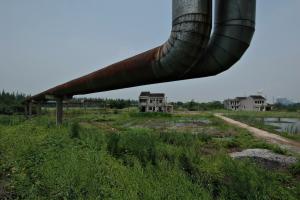Friday, November 30, 2018
3:00 pm - 6:00 pm
McCune Conference Room (6020 HSSB)
Join us for a panel discussion on the politics of carbon. The panel will feature presentations by
Javiera Barandiaran (
Global Studies),
Jia-Ching Chen (Global Studies), and
Hannah Appel (Anthropology, UCLA).
Timothy Mitchell (Middle Eastern, South Asian and African Studies, Columbia University) will serve as the discussant.
“Lithium and Development Imaginaries in Chile and Argentina"
Javiera Barandiarán is Assistant Professor in the Global Studies program at the University of California, Santa Barbara. Barandiarán received her Ph.D. in 2013 from the University of California, Berkeley in Environmental Science, Policy and Management. She holds a Masters in Public Policy also from Berkeley and received her B.A. in politics from the University of Edinburgh, Scotland. Her research has been awarded support from the Social Science Research Council and the National Science Foundation. Barandiarán works on environmental politics, experts and the state in Latin America, to understand how states come to know about the environment in order to regulate it. Working from science and technology studies, Dr. Barandiaran's new book, Science and Environment in Chile: The Politics of Expert Advice in a Neoliberal Democracy (MIT Press), examines how scientists participate in environmental conflicts, with attendant demands for justice, in Chile. She has also been conducting fieldwork on the politics of lithium extraction and industrialization in Chile, Argentina, and Bolivia.
"The High-Carbon Politics of Manufacturing Low-Carbon Energy"
Jia-Ching Chen is an urban, development, and environmental studies researcher and Assistant Professor in the Department of Global Studies at the University of California, Santa Barbara. Currently, his interests are in China's role in shaping the global green economy and the spread of Chinese planning expertise through its international development activities. He also has professional experience in social movements and organized labor. Dr. Chen received his PhD from the University of California, Berkeley, in City & Regional Planning with a designated emphasis in Global Metropolitan Studies and outside fields in Geography and Anthropology.
“Oil and the Licit Life of Capitalism in Equatorial Guinea”
Hannah Appel is an Assistant Professor of Anthropology at UCLA. Her first book - Oil and the Licit Life of Capitalism in Equatorial Guinea (forthcoming with Duke UP, 2019) - is both an account of a specific capitalist project—US oil companies working off the shores of Equatorial Guinea—and an exploration of more general forms and processes—the offshore, contracts, infrastructures, “the” economy—that facilitate diverse capitalist projects around the world. These forms and processes constitute the licit life of capitalism, and they take shape within the raced and gendered histories of colonialism, empire, and white supremacy out of which capitalism emerged. Hannah is at work on a second longterm ethnographic project on African owned and capitalized Pan African Banks, and is also a founding member and organizer of The Debt Collective (debtcollective.org).
Panel Discussant: Timothy Mitchell (Middle Eastern, South Asian and African Studies, Columbia University)
Timothy Mitchell is a political theorist and historian. His areas of research include the place of colonialism in the making of modernity, the material and technical politics of the Middle East, and the role of economics and other forms of expert knowledge in the government of collective life. Much of his current work is concerned with ways of thinking about politics that allow material and technical things more weight than they are given in conventional political theory. Educated at Queens' College, Cambridge, where he received a first-class honours degree in History, Mitchell completed his Ph.D. in Politics and Near Eastern Studies at Princeton University in 1984. He joined Columbia University in 2008 after teaching for twenty-five years at New York University, where he served as Director of the Center for Near Eastern Studies. At Columbia he teaches courses on the history and politics of the Middle East, colonialism, and the politics of technical things.


